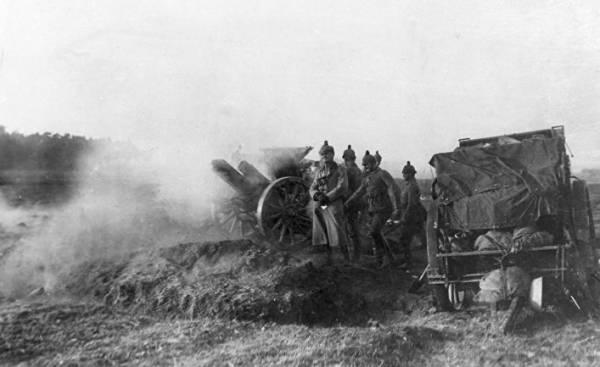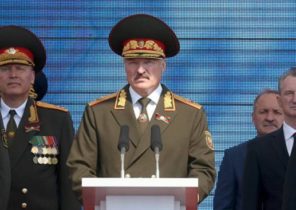
The German Empire has always been a country about which you can say “Woe from wit”. Illustrative example is the invasion of neutral Belgium. From a military point of view, the attack on Belgium was a brilliant move that allowed us to move away from the French armies and fortifications on the Franco-German border to the North and then turn South to capture Paris and the encirclement of the French army from the rear. This tactic reflects traditional for Germans in mobile warfare (Bewegungskrieg), which is considered an excellent method in comparison with the static model of war of attrition (Stellungskrieg), which could only contribute to the numerical superiority of the opponents.
Can we call it a strategically brilliant move? Absolutely. But it could lead to the defeat of Germany.
When it comes to alternative history, is Central to the Second world war. Dozens of books and war games shows us how to develop the course of history, if Hitler had invaded Britain, but not attacked Russia. Want to know what happens if the aircraft carrier class “Nimitz” will return to bomb the Japanese Harbor pearl Harbor? Here you can see the video. What would the world win the war on Nazi Germany? The books outlined, mostly grim picture. Could the Third Reich to win, if the jets were invented earlier? On the forums of the Internet such topics are the effect of “incendiary bombs”.
And yet I wonder why these issues deserve more attention than those in which the question is about what would have happened if Germany had not invaded Belgium in 1914, or if the Kaiser had built more submarines, and America did not participate in the war? Since we can represent the chronology of historical events where wins Hitler, so why not imagine that Russia, for example, still ruled by kings, the British Empire was never exhausted by wars, and the middle East is still in the power of the Ottoman Empire?
Hypothetical versions of the story of the First world war hindered, apparently, the dark aura of fatalism. It seems that no matter what, it would become a protracted one terrible massacre of length 4 years — a kind of living embodiment of cinematographic novel “Paths of glory”. But the belligerents were not drones or sheep, and the conflict was more than just a dirty slaughterhouse. In Russia and Poland, it was maneuverable war, Turkey — a sea invasion, and in East Africa — guerrilla war.
It’s also easy to assume that the defeat of Germany was inevitably dependent on its allies in the coalition, which was better staffed, weapons and money. And yet, Germany is almost captured Paris in 1914, crushed Serbia and Romania, brought to revolt the French army, withdrew Russia from the war and was incredibly close to victory on the Western front in 1918. Shouldn’t have underestimated the power of the German Empire. Her enemies did this up until the signing of the armistice on 11 November 1918.
Let’s see, what could in this case to occur. Here are a few speculations about how this would shape the history of Germany:
To avoid war on two fronts:
About Germany of the 20th century you can simply say: “this is what happens to those who fight on two fronts”. Only in movies is it possible that owning a kung fu hero fights with multiple opponents, but in real life enemies it is better to conquer alone.
That was the idea of the Schlieffen plan, which called to focus all military might on one enemy — France, while maintaining a weak position in the East. The main goal was to quickly defeat France while mobilized vast and underdeveloped Russia, and then by railway to send troops for the destruction of the Russian monarch.
However, in August 1914, Russia invaded Eastern Prussia, was surrounded and defeated at the battle of Tannenberg. In the famous battle of Russia has lost 170 000 of its soldiers against 12 000 German. But the Russian offensive is still scared of the chief of staff of the German army, Helmuth von Moltke, in consequence of which he transferred three military corps from France to East Prussia. But arrive in time to do battle they did not, thereby depriving the West of vital troops at Germany’s best for the time to victory over France and the possible end of the war.
Since then, Germany had to allocate power between the West and the East, thereby supporting its Austro-Hungarian and Turkish allies. In 1918 it became obvious that Germany could have achieved more if it had concentrated all its forces on one front. Force forcing the Soviet government to sue for peace, Germany quickly moved 500 000 soldiers to France. The Germans also implemented a new assault tactics — an early form of blitzkrieg without the use of tanks, which in turn gave them the opportunity to break the deadlock of trench warfare.
The offensive called “battle of the Kaiser” (Kaiserschlacht) destroyed several British armies and forced commander Douglas Haig to warn his soldiers that they literally “pinned to the wall.” After four years of ruthless fighting and the economic blockade of Germany still could for several weeks greater than the time lasted four years of bloody offensives at Passchendaele, the Somme and Chemin des dames.
Ideally, Germany could go through diplomatic channels to fight against Russia alone without war with France, or Vice versa. And in case of failure, given that in the West the distances are shorter it would be better to give some belonged to East Prussia territory, threw all their forces to capture Paris. It would not be so easy, but much easier than fighting on two fronts.







